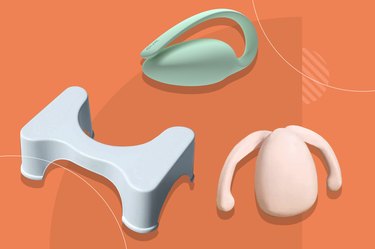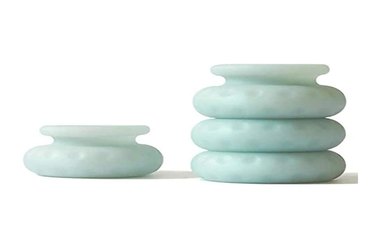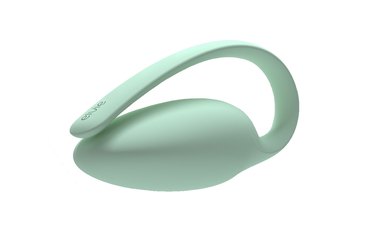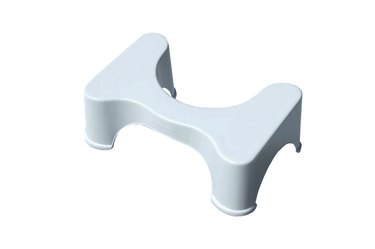
Your pelvic floor muscles are the group of muscles and tissues that work to hold your pelvic organs in place and keep them functioning properly. That's why keeping an eye on your pelvic floor health is important at any age or stage of life.
Pelvic organs include the bladder, urethra, intestines and rectum, as well as the uterus, cervix and vagina in people assigned female at birth (AFAB), per the Eunice Kennedy Shriver National Institute of Child Health and Human Development (NICHD).
Video of the Day
Video of the Day
Maintaining a strong and healthy pelvic floor can help with the following, per the National Association for Continence (NAFC):
- Reducing lower back pain
- Alleviating symptoms of pelvic organ prolapse (dropping of pelvic organs from their normal position)
- Maintaining continence (the ability to control your bladder and bowel movements)
- Improving sexual intercourse
It's also important to take care of your pelvic floor because it is connected to the health of other areas of the body. For example, weak pelvic floor muscles can put a strain on your hip and back muscles, according to NAFC.
Luckily, there are a slew of products on the market — like kegel machines and pelvic floor toners — that may help support better pelvic floor health. Here are our top picks.
Quick Picks
- Dame Eva ($135, Dame.com)
- Ohnut Ring ($65, Amazon.com)
- Elvie Trainer ($199, Elvie.com)
- Squatty Potty Stool ($24.99, SquattyPotty.com)
How We Chose
We spoke to three pelvic floor physical therapists who shared their top picks when it come to products for better pelvic floor health. We used their recommendations and chose products that help support different facets of your pelvic health, including sexual activity, pelvic floor strength and pooping.
Tip
"The pelvic floor muscles do not function completely by themselves. So, using products that only emphasize kegels or pelvic floor muscle contraction should be part of a comprehensive program and not the only aspect of care," says Tina Christie, PT, CCE, senior physical therapist, certified childbirth educator and Women's Health Program Manager for Athletico Physical Therapy.
1. Dame Eva
While vibrators and other sexual wellness aids aren't always thought of as tools to help you improve your pelvic health, sexual health is absolutely connected to your pelvic health.
"Caring for your sexual health is caring for your entire pelvic health — you can't have one without the other," says Ashley Rawlins, PT, DPT, physical therapist at Origin. "It can be argued that shame and stigma around sexual function can impact your pelvic health."
Your pelvic floor health and sexual functioning are connected, per the National Association for Continence. A strong pelvic floor can help make vaginal intercourse more comfortable, promote orgasm and increase vaginal lubrication. In turn, regular orgasms can help keep your pelvic floor strong.
This hands-free vibrator stands out from others on the market in that it can rest internally during sex.
"You can't go wrong with any of Dame's products, but the Eva is designed to snuggle up to your clitoris during sexual activity, with vibration to help stimulate and maximize sexual pleasure," Rawlins says.
Buy it: Dame.com; Price: $135
2. Ohnut Ring
The Ohnut Ring is a squishy, stretchy and stackable device that can be worn by a partner or used with an insertable sex toy. It helps make penetrative sex customizable by limiting the depth of penetration.
Plus, the company behind the device offers a wealth of educational resources that focus on pelvic health and sexual wellness.
Rawlins recommends the Ohnut ring for people who experience pain during penetrative sex.
"Ask any pelvic physical therapist and they will tell you that sex shouldn't hurt. Even though pain during sex is common, it is never normal," she says." We also know that fear of and the response to pain (i.e. tensing your muscles further) will often worsen pelvic floor dysfunction."
Buy it: Amazon.com; Price: $65
3. Elvie Trainer
The Elvie Trainer is a smart kegel trainer that helps you visualize your pelvic floor movements. The user wears the small, insertable device and links it to the corresponding app, which uses biofeedback (electrical devices or manual techniques that give you greater body awareness) to give you a visualization of your pelvic floor movements.
Kegels are one of the most popular pelvic floor exercises, but people with vaginas often perform them incorrectly, which can lead to developing or worsening PFD, per the University of Chicago Medicine.
"Elvie is a great option because its small size makes it comfortable for most bodies and its technology helps you to learn how to accurately and effectively exercise your muscles — it notifies you if you aren't using your muscles the right way," Rawlins says.
To do a kegel properly, you should be squeezing and not pushing your pelvic floor muscles, per Penn Medicine. You also shouldn't be clenching your abdomen or butt muscles.
Think of the Elvie trainer as a personal trainer for your pelvic floor muscles: It corrects your kegel form, the way a personal trainer might correct your form during certain exercises.
"Its accompanying app provides you with programs to follow so that you don't even have to think about what you're doing and can track your progress along the way," Rawlins says.
Buy it: Elvie.com; Price: $199
4. Squatty Potty Stool
The Squatty Potty comes in several different versions and heights and is a U.S. Food & Drug Administration (FDA)-certified medical device that can help you reduce poop strain.
This handy stool is also classified as a defecation postural modification device (DPMD), which is fancy speak for a device that helps position you for more productive pooping.
A March 2019 study in the Journal of Clinical Gastroenterology found that using a DMPD resulted in increased bowel emptiness and reduced straining in a small sample of people who experienced straining and an incomplete emptying of their bowels.
Because the Squatty Potty and other DPMDs position you in a squat, rather than a seated position, they may help improve your pooping, but the research is limited.
An April 2010 study in Lower Urinary Tract Symptoms, with an extremely small sample size, found a link between reduced poop strain and squatting on the toilet because squatting helps to open the rectum and straighten the colon. However, this is an older study and more research is needed on the positive effects that squatting may have on pooping.
"I think that foot stools at the toilet, like the Squatty Potty, are a gender-neutral way to help many people support bowel health, which is an important component of pelvic health," says Jessica L. McKinney, PT, DScPT, physical therapist and vice president of medical affairs and clinical advocacy for Renovia Inc.
Buy it: SquattyPotty.com; Price: $24.99
Do Pelvic Floor Products Work?
Pelvic floor devices and products are often marketed as aids to people (often people AFAB) who are experiencing various types of pelvic floor dysfunction (PFD). But people of all genders can experience PFD, which happens when the pelvic floor muscles are weakened or injured, according to the NICHD.
Some common causes of PFD, per the Cleveland Clinic, include:
- Traumatic injuries like a car accident
- Pregnancy
- Overusing the pelvic muscles
- Pelvic surgery
- Having overweight
- Advancing age
There are devices like pelvic floor biofeedback devices that can monitor the squeezing of pelvic floor muscles, kegel exercisers that can help strengthen your pelvic muscles and even electrical stimulation devices that can help to treat incontinence.
Pelvic floor products may help motivate you to focus on your pelvic health more, but they aren't a magic cure. And they work best when used as part of an overall care plan for your pelvic health.
Tip
Seeing a pelvic floor physical therapist who specializes in pelvic floor health may be best, in order to help you establish a routine for taking care of your pelvic floor, per Cedars-Sinai. Talking to a urogynecologist (doctors who specialize in pelvic health), when possible, is also a good idea.
What to Look for in Products to Support Your Pelvic Floor Health
Here's what to look for in safe and effective pelvic floor products:
1. Cleared by the FDA
"In my opinion, people AFAB should be cautious using devices or other products that lack FDA clearance or have unsubstantiated clinical claims, which can include many of the products easily and directly purchased online," McKinney says.
2. Supported by Published Data
McKinney also recommends choosing pelvic floor products that have been backed by published data, like randomized controlled clinical studies.
What to Avoid
Here's what to avoid when shopping for pelvic floor products:
1. Avoid Scented, Flavored and Chemical-Heavy Products
"For your best pelvic health and to avoid an infection, your vagina and vulva require minimal maintenance, good hygiene practices and products without harsh chemicals," Rawlins says. "And always avoid fancy soaps, douches, deodorants or anything that is scented, has sparkles or is flavored."
As with any purchase, but especially pelvic health products (which can be expensive), it's important to use good judgment and do your own research.
2. Products That Aren't FDA-Cleared
Do your best to look for FDA-cleared or research-supported pelvic floor products when possible. Products that aren't backed by the FDA or clinical research could still be potentially beneficial for you. But be sure to discuss them with your doctor before use.
- NICHD: "About Pelvic Floor Disorders (PFDs)"
- NAFC: "Why A Healthy Pelvic Floor Is Important"
- Cleveland Clinic: "Pelvic Floor Dysfunction"
- Cedars-Sinai: "Can Digital Devices Help Exercise Your Pelvic Floor?"
- University of Chicago Medicine: "Kegels: The 30-second exercise that can improve incontinence and sex"
- Journal of Clinical Gastroenterology: "Implementation of a Defecation Posture Modification Device: Impact on Bowel Movement Patterns in Healthy Subjects"
- Lower Urinary Tract Symptoms: "Influence of Body Position on Defecation in Humans"
- Penn Medicine: "How do I know if I'm doing Kegels right?"
- NAFC: "Sex and Your Pelvic Floor"
Is this an emergency? If you are experiencing serious medical symptoms, please see the National Library of Medicine’s list of signs you need emergency medical attention or call 911.






